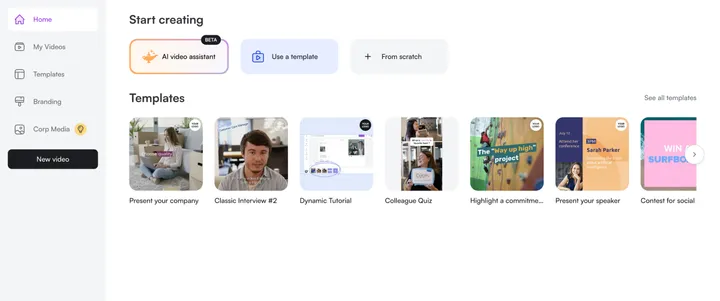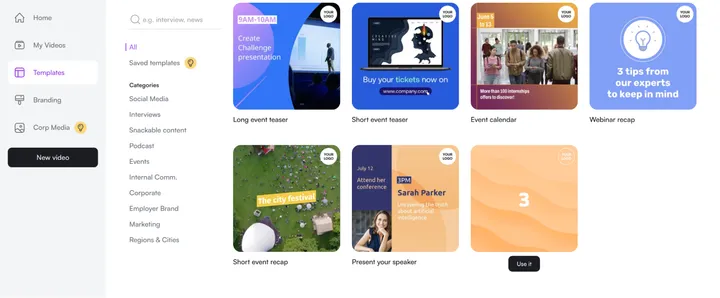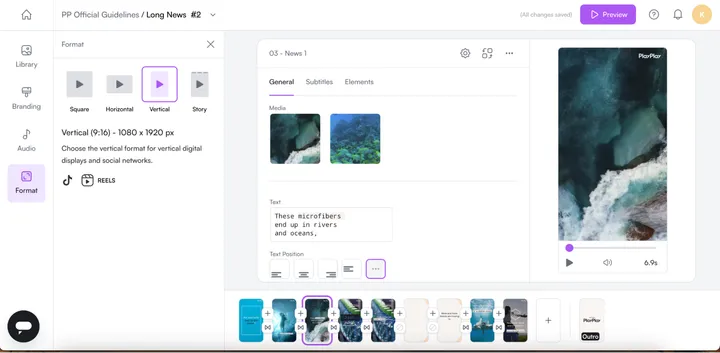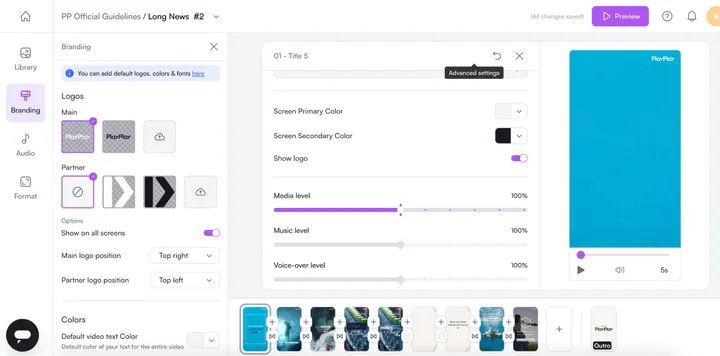Vertical videos have become increasingly popular for businesses due to the rise of mobile devices and social media platforms that are designed for vertical content consumption, such as Instagram Stories, Snapchat, and TikTok.
These digital platforms and types of content such as Stories, encourage users to hold their phones in a vertical position, making vertical videos a better experience for users on mobile screens.
Let’s dive into the nuts and bolts of vertical digital marketing videos, social media tips, and how to incorporate them into your business’s digital marketing strategy, so that you can post them for free on all your media channels and boost your business in no time.
What is vertical video marketing?
Vertical video digital marketing is a strategy that involves creating and sharing video content that is specifically designed to be viewed on mobile phones in a vertical (portrait) orientation. This means users can view these videos while holding their phone in an upright position.
Vertical videos emerged from social platforms like Instagram, Snapchat, and TikTok — making this video format a staple for social media videos and marketing. The social media platform feature “Stories” on multiple apps also favors the vertical format for a better user experience.
However, vertical format videos are slowly making their way into other aspects of mobile marketing, especially for brands targeting young millennial and Gen-Z users. This pool of users prefers consuming media in this format, so companies should always aim to format their content vertically to improve user experience and potentially boost their sales.
Why vertical videos are a must-have for your brand
If you think it doesn’t matter how you record video content for your brand footage, think again. Here’s why you should consider including vertical video footage in your content strategy.
1. It’s what your audience wants
How often do you scroll social media, browse the Internet, or view media on your mobile phone horizontally? Rarely, unless you’re viewing a movie on Netflix’s mobile phone app, where the horizontal format is a better bet.
It’s the same with any business’s audience, or most mobile phone users. In fact, smartphone users hold their phones vertically more than 90% of the time. So, it only makes sense that you publish video footage with a format that matches users’ preferred viewing format to guarantee meeting their experience expectations.
2. It’s mobile-first
More than 75% of Americans shop on their mobile phones, making it a viable sales channel.
To increase your chances of driving sales and revenue on mobile phones , you need to optimize all your digital marketing materials, especially videos for viewing on mobile phones. That way, potential customers and users can interact with your content and make a purchase conveniently.
Publishing vertical videos will accomplish this for your brand as these videos are automatically mobile first for a better experience.
3. High level of engagement
We’ll let the data do the talking here. Buffer and Animoto compared vertical videos to other Instagram feed video formats and discovered that:
- Animoto’s vertical video resulted in 13% more 3-second video views and 157 percent more 50% total watch time views.
- Buffer’s vertical video resulted in 6% more 3-second video views and 187 percent more 50% total watch time views.
The more people engage with your video footage, the more likely the algorithm will boost your content to reach more people on social media. On top of that, when your followers engage with your content or video footage, they are more likely to share it with their own followers on social media, which increases organic brand exposure.
6 tips for successful vertical videos
Now that you know why vertical videos matter, here’s how you can set up your vertical video marketing strategy for success on any social media platform.
1. Use the right dimensions
The correct aspect ratio of any vertical footage is 9:16 — that is, a width of 9 units and a height of 16 units.
Obviously, the easiest way to achieve this is to shoot your video vertically. If you can’t pull this off or repurpose other content, consider using video editing software to resize your content. PlayPlay, for example, lets you preset your content’s aspect ratio and export your video in these dimensions in a single click.

Want to learn more about LinkedIn video dimensions?
2. Frame your shot thoughtfully
Prioritize the most important elements within the vertical frame. Ensure that your subject is well-centered, easily visible, and not taking part in any background action. On top of that, avoid clutter and distractions in the background, as a clean and well-composed shot enhances viewer focus.
Thinkific does this well in this video. You’ll notice that the text (which communicates the video’s core message) is placed right at the center of the screen for visibility, instead of being in the background. The background images and colors do not distract the viewer from the text on the screen.
3. Use captions
A 2021 Sharethrough Survey found that 75% of people view video footage on mute — that is, with zero sound. This means if you rely entirely on sound to communicate with your audience, chances are you won’t achieve this goal.
That’s why you need to add closed captions to your vertical videos. Closed captions are time-synced text or subtitles that appear on a video. They help the viewer understand the context and message of the video without sound.
It’s great for accessibility too. People who have hearing difficulties can read these words to know what your video is talking about and find out more about your business objectives. Here’s an example of how Buffer pulls this off.
Add automatic subtitles to your videos on PlayPlay
Get editable, automatic and instant subtitles to all your video content in minutes with PlayPlay's intuitive platform.
Try for free 4. Keep it short and simple
One thing is certain: Very few people want to view a movie-length video on TikTok or YouTube. So keep your vertical videos concise and try to pass your core message across quickly, especially if you plan to share it on social channels.
Social channels have their recommended social media video lengths. For example, TikTok lets you upload videos that are up to 10 minutes long, although many TikTokers say the ideal video length is 7–15 seconds. And when you create Instagram videos in Reels, they can be up to 90 seconds long.
Keep your videos at the ideal length for the channel you're uploading to for best results.
5. Open with a strong hook
The hook is what captures the audience’s attention and prompts them to stop scrolling and view your video. It’s super important for social channels where a lot of video content marketing is vying for the viewer’s attention at the same time.
A strong hook for a business’s vertical video should be attention-grabbing, engaging, and relevant to the target audience. Some effective ways to create a strong hook include using humor, posing a question, or starting with an intriguing visual.
Take this video from Spotify, for example. It opens with a focus on still water which intrigues the viewer and prompts them to stay for what’s next.
6. Brand your video
Adding your brand color to your video will boost brand recognition by 80%. Other visual elements like your logo and mascot animations also make it easier for your target audience to recognize and remember your brand.
Subtly incorporate the brand elements into your video so they don’t distract the audience from the video’s core message. For example, you can use your brand colors for on-screen text. Or add an outro screen with your brand name and logo — like PlayPlay does in this video.
How to create effective vertical videos for your brand with PlayPlay
PlayPlay is an easy-to-use video software that lets you create and edit vertical videos without writing any code.
It’s packed with customizable templates that you can tweak to match your brand’s visual appearance. It also has an AI Video Generator that lets you create professional vertical videos from a single prompt and a Social Media Post Generator to help you create content for any platform!
Let's show you how to use PlayPlay to create vertical marketing videos quickly.
Step 1: Sign up for a free PlayPlay account.
Step 2: Select how you want to create the video. You can choose a template, try the AI video assistant, or do it from scratch. For this tutorial, we'll use a template.
Step 3: Choose your preferred template. We’ll use the “present your company” template. Selecting the template takes you to the video editor.
Step 4: Click “upload media” to import your recorded video into your project dashboard.
Step 5: Edit the video elements. There’s so much PlayPlay lets you do here. For example, you can change text and color, add new screens, music, and text and crop your video.

Top tip for vertical PlayPlay videos
For vertical videos make sure to click on format -> vertical in the sidebar. This will update your video’s aspect ratio to vertical and automatically readjust your content to fit the new format without any quality loss to your assets.
Step 6: Add your brand elements like logo, color, and typography to the video. Remember to save them in our handy branding feature so you don’t have to start from scratch for subsequent videos.
Step 7: Click “Preview” at the top right corner of your screen to see what your video looks like.
Step 8: If you’re satisfied with the look and feel, click “Generate HD video” at the bottom right corner of your screen to create a high-definition quality video. This will take a few minutes.
Step 9: That’s it! Your vertical marketing video is ready to go live. Share it with your team for review, or download and upload it to your communication channels in seconds.
Power your vertical video marketing strategy with PlayPlay
Don’t miss out on the benefits of vertical video marketing. With PlayPlay, you can create vertical videos at scale — without the overhead costs of an in-house video professional. Our software is really easy to use and offers a ton of options for creating engaging, creative and professional vertical video content.
See how PlayPlay works for free.
Find answers to common questions you have about vertical marketing videos below.
Vertical video marketing FAQs
A vertical marketing video refers to a video that is specifically created and optimized for vertical viewing, as opposed to the traditional horizontal or landscape orientation. Vertical videos are shot in a portrait aspect ratio, typically with an aspect ratio of 9:16, where the height is greater than the width.
In most cases, yes, vertical videos get more views on social platforms compared to square and horizontal videos. A Buffer experiment found that vertical marketing videos get 187 percent more 50% total watch time views for Instagram feed videos than horizontal or square ones.
To shoot a vertical video, simply hold your phone in a vertical position and record the video. You can also use editing software to adjust the aspect ratio of your video to make it vertical.






